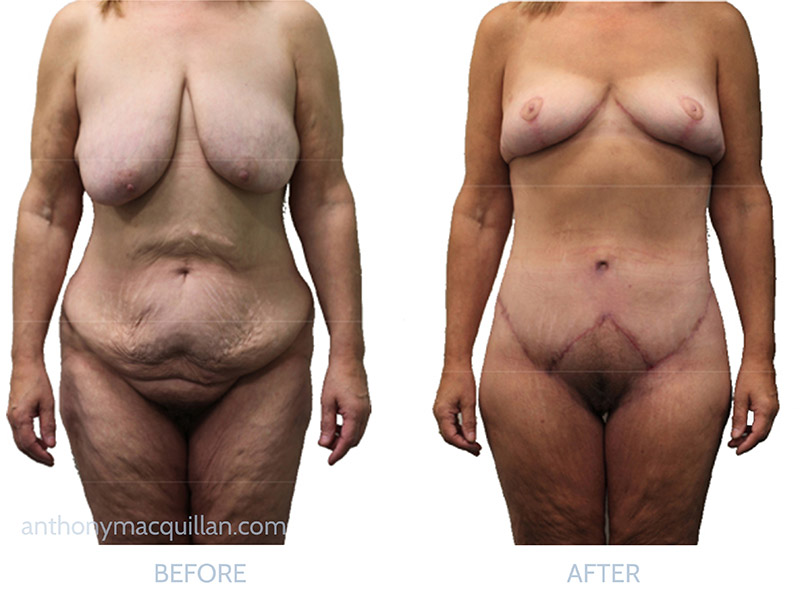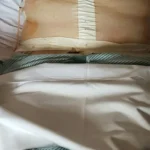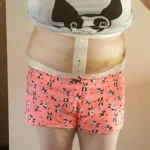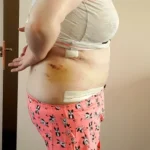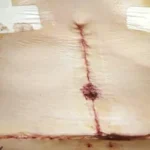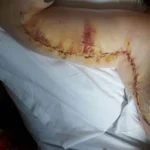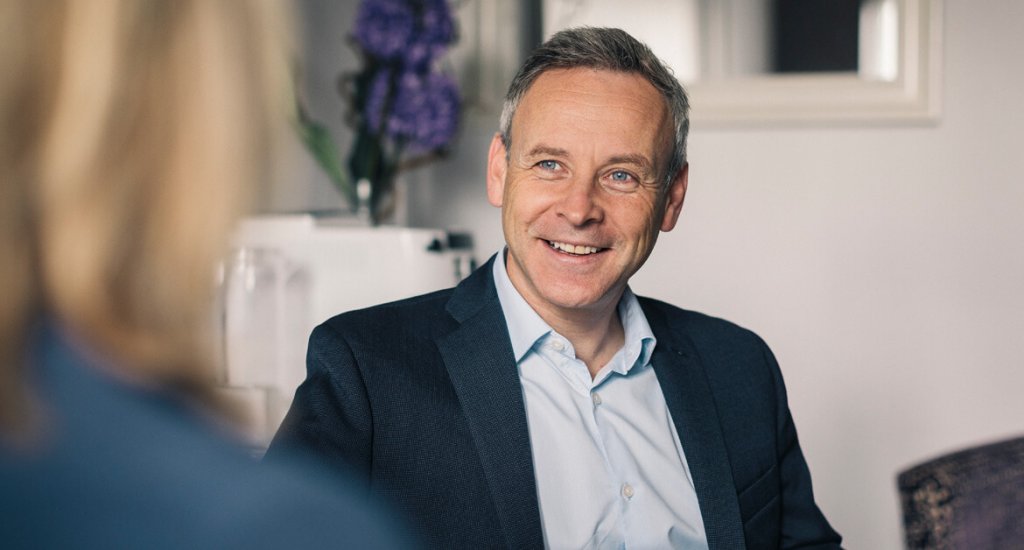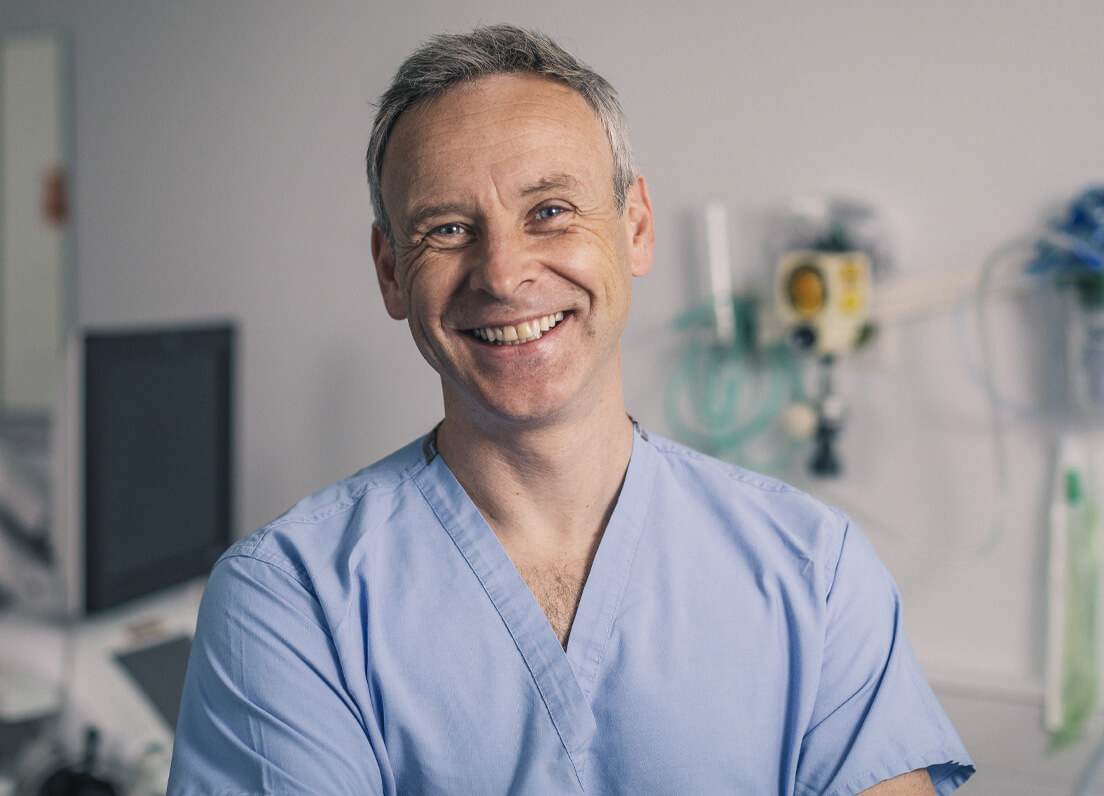Body Lift surgery, also known as Body Contouring surgery, is a complex cosmetic procedure aimed at enhancing the shape and tone of the underlying tissue that supports skin and fat.
Excess Skin Removal Surgery is particularly beneficial for individuals who have undergone significant weight loss, which has led to sagging skin and irregular contours in various areas of the body.
Excessive weight loss can often leave behind skin that has been stretched and is unable to conform to the new body size. In such instances, Body Lift surgery offers a comprehensive solution. The Body Lift procedure typically focuses on removing excess skin and fat while improving the shape of the underlying support tissue. The result is a more normal appearance with smoother contours.
Body Lift surgery can be performed on various parts of the body, including the abdominal area, buttocks, thighs, and breasts. The surgery can either target one specific area or several areas simultaneously, depending on your needs and desired outcomes.
Body Lift surgery addresses excess skin around the lower trunk, both front and back, elevating the buttocks, lifting the pubic region and the lateral portion of the thighs. It can be combined with a medial or full Thigh Lift.
In certain circumstances, Mr MacQuillan, together with a consultant colleague, will combine a full Lower Body Lift with a Brachioplasty (Arm Lift) and Breast Uplift (Mastopexy), known as a total Body Lift, so that post-operative downtime can be reduced.
This surgery is specialised and requires careful preoperative planning and medical work-up, normally including the use of diet supplements. If you are considering Body Lift surgery, please make this clear when booking a consultation as extra time will be allowed to cover all the essential points in detail.
Body Lift is quite extensive and differs significantly from other cosmetic surgeries like Liposuction, which only removes excess fat and does not address issues related to sagging skin. Body Lift surgery is more about redefining and reshaping the entire figure rather than just removing unwanted fat.
3-4 hours
General
1-2 nights
6 to 12 weeks
A dramatic improvement will be obvious immediately, but it can take a year for swelling to go and scars to fully heal.
Benefits of Body Lift Surgery
Body Lift surgery offers a multitude of benefits, many of which extend beyond mere aesthetic enhancement. While the primary objective of this surgery is to remove excess skin and fat to improve body contours, the advantages are multifaceted:
- Improved Physical Appearance: The most immediate and noticeable benefit is the enhancement of your physical appearance. By removing excess skin, fat and tightening the remaining tissue, Body Lift surgery creates a more toned, defined, and proportionate body shape. This can lead to significant improvements in body image and self-esteem.
- Increased Comfort and Mobility: Excess skin can cause physical discomfort and hinder mobility. Chafing, skin irritation, and infections are common issues associated with large folds of skin. After a Body Lift, you experience relief from these symptoms, making daily activities more comfortable and enjoyable.
- Expanded Clothing Options: Many patients find that after Body Lift surgery, they have a wider variety of clothing options available to them. Clothes fit better and are more flattering, which can be a significant boost to self-confidence.
- Encouragement for a Healthy Lifestyle: The improved body image and increased comfort can motivate individuals to maintain a healthy lifestyle, including regular exercise and a balanced diet, to preserve the results of their surgery.
- Long-lasting Results: When accompanied by a stable weight and a healthy lifestyle, the results of a body lift can be long-lasting. The removal of excess skin and fat is permanent, and as long as you maintain a stable weight, the improved body contour can be permanent.
- Psychological Benefits: The psychological impact of a Body Lift can be profound. Many patients report improved self-esteem, reduced anxiety, and a more positive outlook on life following their surgery.
Who Needs Body Lift Surgery?
Body Lift surgery is not a one-size-fits-all solution. It’s specifically tailored for individuals who have lost a significant amount of weight and are left with loose, hanging skin that has lost its elasticity. This situation is often the result of substantial weight loss, either through diet and exercise or after bariatric surgery (weight loss surgery).
Candidates for Body Lift surgery typically share several common characteristics:
- Significant Weight Loss: Individuals who have lost a large amount of weight and have been at a stable weight for at least 6-12 months are ideal candidates. This stability is crucial to ensure that the results of the surgery are not compromised by further weight fluctuations.
- Excess Skin: Excessive skin in various areas of the body, which may cause physical discomfort or hygiene issues, is a primary reason for seeking Body Lift surgery. This skin often cannot be toned through exercise alone and requires surgical intervention.
- Good Health: Candidates must be in good general health, without chronic medical conditions that could impair healing or increase surgical risk.
- Non-smokers: Smoking can significantly hinder the healing process and increase the risk of complications both during and after surgery. Therefore, non-smokers or those who have quit smoking well in advance of the surgery are ideal candidates.
- Realistic Expectations: It’s essential for individuals considering Body Lift surgery to have realistic expectations about the results. While the surgery can dramatically improve appearance and enhance self-confidence, it is important to understand the limitations and risks associated with the procedure.
- Commitment to a Healthy Lifestyle: Maintaining the results of Body Lift surgery requires a commitment to a healthy lifestyle, including regular exercise and a balanced diet. This commitment ensures that the positive effects of the surgery are long-lasting.
Body Lift surgery can be the recommended procedure for those who have experienced massive weight loss, helping to restore confidence and improve quality of life. However, it is a major surgical undertaking that requires careful consideration and consultation with a qualified plastic surgeon to ensure it is the right choice for the individual’s specific needs and circumstances.
When Should You Undergo Body Contouring After Extreme Weight Loss?
Losing a great deal of weight, either through diet and exercise or as a result of bariatric surgery, is a huge accomplishment which should be celebrated and the positive benefits in terms of your health and impact on relationships are manifold. Yet many men and women find that their physical appearance is still far from satisfactory.
If you’ve lost the weight over a relatively short amount of time and have been carrying that excess weight for many years, it’s likely that your skin will fail to shrink as the pounds drop off. This can result in excess, sagging skin being left on the abdomen, arms, legs, back, breasts and even face. This excess skin can cause hygiene and medical problems, limit what you can wear and even limit your mobility.
This is the moment that many turn to body contouring surgery which aims to remove this excess skin, helping you to achieve the body you’ve long dreamt of. There are a whole host of body contouring surgery procedures, from tummy tucks to full body lifts, that can be performed, but the timing has to be right. If you’ve just undergone extreme weight loss, there are three main questions which will need answering before any plastic surgeon will recommend you go ahead with surgery…
Are you capable of maintaining a stable weight?
You’ve already put in enormous work in losing so much weight. But it’s essential that you can demonstrate to you and your surgeon that you can keep that weight off. Any significant weight gains between now and your surgery can have a massively negative impact on the outcome of surgery. Bottom line: the best candidates should already be at their ideal weight (or as close to it as possible) beforehand.
Are you in general good health?
You don’t have to be in the peak of condition to be suitable for surgery, but there are a few rules of thumb. If you’ve lost weight via bariatric surgery, it’s essential that you give your body time to reset before embarking on further surgery.
More importantly, it’s essential that you can demonstrate that you’ve switched to a healthier lifestyle and are doing what you need to do to avoid extreme weight gain. You won’t have to diet while you recover from surgery, but you will have to concentrate on eating enough of the right foods.
Do you have a goal – and is it realistic?
In most cases, that goal is simple: you’ve done a lot of work on your body, but there are certain things – a pocket of fat, or skin that refuses to ‘snap’ back into place – and you want a procedure to put that right. You will be left with a degree of scarring as a result of surgery, but the majority of patients are happy to accept this in exchange for the marked improvement in their appearance.
Different Types of Body Lift Surgery
Lower Body Lift
A Lower Body Lift, also known as a Belt Lipectomy, involves the abdomen, waist, hips, buttocks, and thighs. This procedure is often chosen by patients who have sagging skin in these areas due to weight loss or ageing. The surgery lifts and tightens the skin, resulting in a smoother, more toned lower body.
Upper Body Lift
This procedure focuses on the upper parts of the body, including the breasts, chest, and mid-back. It’s often sought by individuals who have lost a significant amount of weight and are left with sagging skin in these areas. An Upper Body Lift can also involve an Arm Lift (Brachioplasty) to address sagging skin on the upper arms.
Total Body Lift
A Total Body Lift combines both Upper and Lower Body Lift procedures. It’s a comprehensive approach for individuals who have undergone massive weight loss that has left them with extensive excess skin throughout their body. This procedure requires careful planning and is typically performed in stages.
Mid Body Lift
A Mid Body Lift targets the midsection, including the abdomen, lower back, and sometimes the thighs. This procedure is often combined with Abdominoplasty (Tummy Tuck) to tighten the abdominal muscles and remove excess skin and fat.
Thigh Lift
Specifically focusing on the thighs, this procedure aims to tighten the skin and improve the contour of the inner or outer thighs. It’s often chosen by patients who are unhappy with the sagging skin in their thigh area due to weight loss or ageing.
How Is the Surgery Performed?
Body Lift surgery is a highly individualised procedure, often requiring several hours in the operating theatre, depending on the extent of the surgery and the specific areas being addressed.
Surgery can be categorised into different types based on the area of the body being treated. Each type of Body Lift surgery is tailored to your needs and desired outcomes. Anthony will assess your body and discuss your goals to determine the most appropriate type of Body Lift surgery for you.
The Body Lift surgery involves the following steps:
- Initial Consultation: Before the surgery, you undergo a detailed consultation with Anthony. During this phase, medical history is reviewed, physical examination is conducted, and surgical goals are discussed. This step is crucial for creating a customised surgical plan.
- Anaesthesia: The surgery is performed under general anaesthesia to ensure your comfort throughout the procedure.
- Incision: Anthony makes incisions in the predetermined areas. The pattern and length of the incisions depend on the amount and location of excess skin to be removed, as well as personal preference and surgical judgment. In a Lower Body Lift, for example, the incision might extend around the circumference of the body.
- Removing Excess Skin and Fat: After making the incisions, Anthony removes excess skin and may use liposuction to remove unwanted fat. The underlying tissues are then tightened and reshaped.
- Closing the Incisions: Once the excess skin is removed and the underlying tissue is reshaped, Mr MacQuillan closes the incisions with sutures, skin adhesives, tapes, or clips. This step is critical in defining the contours of the body post-surgery.
- Postoperative Care: After the surgery, you are taken to a recovery area where you are closely monitored. Drains might be placed to collect excess blood or fluid, and medications are administered to manage pain and reduce the risk of infection.
- Recovery: The initial recovery period may involve several days of hospital stay, during which your progress is monitored. Instructions for at-home care are provided, which include guidance on wound care, activities to avoid, and signs to watch for.
Body Lift Recovery and Aftercare
Following Body Lift surgery, you will need to stay in hospital for up to four nights and when you are discharged home you will need someone available to look after you and provide care for at least a week afterwards. Your movement will be restricted and you will find bending and lifting difficult. You may also require help with washing and dressing initially.
How long is the recovery after Body Lift Surgery?
The recovery period varies depending on the extent of surgery and your ability to heal. Some patients need minimal support after the first week or so and others will struggle for quite some time.
A rough guide to normal recovery time is total wound healing completed by four to six weeks following surgery, with a full return to pre-operative levels of activity at 3 to 4 months.
One of the biggest concerns with Body Lift surgery is wound breakdown. Because Body Lift surgery results in a large number of wounds that the body needs to heal simultaneously, there is an increased risk of the wounds breaking down. If this happens, then dressings are required until the healing process is complete (and this can take quite a few weeks).
Additionally, there is the risk of seroma formation at one or more of the surgical sites and these may require repeated drainage. Together with other potential problems (all of which will be discussed in detail at your clinic appointment with Anthony) these can delay the time to complete recovery to varying amounts.
Please do everything possible to help prevent an infection or wound breakdown. Eat well, drink fluids, rest, maintain sterile bandages and avoid touching your open wound.
Recovery from a Body Lift surgery is a gradual process and varies depending on the extent of the surgery and patient health.
Important aspects of the recovery and aftercare include:
- Immediate Postoperative Period: In the first few days following surgery, you can expect swelling, bruising, and discomfort. Pain medication and antibiotics are typically prescribed to manage pain and prevent infection.
- Follow-Up Appointments: Regular follow-up appointments are crucial to monitor the healing process. During these visits, Anthony checks the incisions, removes drains if they are no longer needed, and addresses any concerns.
- Wound Care: Proper care of the incision sites is essential for healing. You are instructed on how to care for their wounds, including cleaning and dressing changes.
- Activity Restrictions: You are advised to avoid strenuous activities and heavy lifting for a period of time, usually several weeks. Gradual reintroduction of activities is recommended as per the Mr MacQuillan’s advice.
- Compression Garments: Wearing compression garments is often recommended to reduce swelling and support the new body contours.
- Long-term Care: Long-term care includes maintaining a stable weight, following a healthy lifestyle, and using sun protection to aid in scar healing and prevent scar worsening.
- Emotional Recovery: Emotional ups and downs are common during recovery. Support from family, friends, and possibly professional counselling can be beneficial.
Body Contouring Surgery Has Higher Risk of Complications for Smokers than Face or Breast Ops
Research published in the Aesthetic Surgery Journal in January 2019 revealed smokers are at a higher risk of suffering complications from cosmetic surgery than non-smokers. More interestingly, the researchers discovered there was a higher risk when cosmetic surgery was carried out on the body, rather than the face or breasts.
Here, we’ll look at the complications smoking can cause during and after surgery on the body, along with what the recent research discovered.
Understanding the new research
The research carried out by the Department of Plastic Surgery at the Vanderbilt University Medical Centre, analysed data from 129,007 patients who underwent cosmetic surgery. The data was provided by the insurance program of CosmetAssure, and around 8.2% of patients were smokers.
It revealed some pretty startling results. Smokers were found to have an increased risk of complications compared to non-smokers. In particular, those who undergo body procedures such as Buttock Augmentation or a Tummy Tuck had a 2.9% major complication rate compared to just 1.9% in non-smokers. The most significant risk came from Thigh Lift surgery, with smoker’s experiencing a 23.8% risk compared to just a 3.6% risk for non-smokers.
It was also discovered that smoking significantly increased the risk of wound infections by as much as 61%. Interestingly, there were no significant differences in the complication rates for breast or facial cosmetic procedures between smokers and non-smokers.
Smoking and tissue necrosis
Smoking has long been known as a risk factor for cosmetic surgery. It can cause a number of complications, with tissue necrosis being one of the most severe.
When surgery is performed, the site needs adequate oxygen levels in order to properly heal. Nicotine, along with carbon monoxide, which is also found in cigarettes, is known to restrict the blood supply. In some cases, this can cause the tissue to die and the part that was operated on will ultimately fall off.
It is worth noting that this is a very rare complication that smokers face. However, the fact that it could happen should be deterrent enough for smokers to avoid surgery until they quit.
Cosmetic surgery shown to help patients quit
Additional research has shown cosmetic surgery can actually help patients to quit. A long-term study showed that out of 42 participants who were smokers, around 40% no longer smoked daily. Almost one-fourth of participants claimed they no longer smoked at all.
This is likely down to the fact that patients are required to stop smoking for two weeks prior to the surgery, and for a set period after surgery. After quitting for a month, it’s much easier for patients to keep it up as the initial side effects have already worn off.
Although quitting smoking certainly isn’t easy, patients are advised to do so prior to undergoing cosmetic surgery. Not only will it help to reduce the risks associated with smoking and surgery, but it will also improve your overall health.
How Much Is Body Lift Surgery in the UK?
The total cost of Body Lift Surgery in the UK depends on the type of procedure being performed and can range from £10,00 to £35,000.
These prices are influenced by numerous factors including the surgeon’s training & experience, the complexity of the operation, the type of anaesthesia, the facility used and the post-op and follow-up care you receive. As every patient is different, you will be given an estimate of the costs for a procedure tailored to your needs after your consultation. It’s also important to ensure that all these necessary items are listed on the quote you receive.
FAQs
Find out more about your surgical journey
How long does it take to see the final results of Body Lift surgery?
The initial results of a Body Lift surgery are visible almost immediately, but it can take up to a year or more to see the final results. This is due to the time needed for swelling to subside and for the body to fully adapt to its new contours. Patience is key, as the healing process is gradual.
Can Body Lift surgery help me lose weight?
Body Lift surgery is not a weight loss procedure. It is designed for individuals who have already lost a significant amount of weight and are looking to remove excess skin and improve body contours. While some weight is lost due to the removal of skin and fat, the primary goal is aesthetic improvement, not weight reduction.
Is Body Lift surgery covered by insurance?
In most cases, Body Lift surgery is considered a cosmetic procedure and is not covered by insurance. However, if there are medical reasons for the surgery, such as chronic skin infections or rashes under the excess skin, partial coverage may be possible. It’s important to check with your insurance provider for specific policy details.
How should I prepare for a Body Lift surgery?
Preparation for a Body Lift surgery includes maintaining a stable weight, quitting smoking, avoiding certain medications that can increase bleeding, and arranging for help during the recovery period. Anthony will provide specific instructions based on your health history and the details of your planned surgery.
What are the 5 steps to a successful Body Lift transformation?
If you’ve been sticking to a health and fitness regime, congratulations: you probably feel a lot healthier than you did this time last year. Whether you look or feel any better is another story, however.
When we lose a significant amount of weight – especially when we’re a little older – we may find that our skin has been unable to keep up with our new look. There’s a specific reason for that: over time, our skin naturally loses its ability to snap back into place after it’s been stretched – partly because we lose natural elasticity, partly because it’s been pulled out of shape for too long.
Luckily, there’s a cosmetic solution: Body Contouring surgery. There are procedures for all parts of the body, from Arm Lifts and leg contouring to a Tummy Tuck. But they all pretty much do the same thing: remove any remaining stubborn pockets of fat with Liposuction, along with the excess skin, in order to restore a natural, taut contour.
Understandably, there is a lot of work involved on the part of the cosmetic surgeon, but the job ultimately begins with you, the patient. Body contouring – and Tummy Tucks in particular – is not for everyone, and there are certain considerations that have to be taken into account by you and Mr Anthony MacQuillan before it is advisable to go ahead with surgery.
1. Be at your target weight
Although you’ll be removing some fat and excess skin, body contouring operations are not weight loss procedures and it is advisable you are near or at your ideal body weight and have maintained this for some time. Firstly, this is to ensure your initial outcome is the best possible, but it is also to ensure you enjoy your results for many years to come. Further weight loss will potentially leave you with more sagging skin and putting on weight could further weaken abdominal muscles that have been tightened during a Tummy Tuck.
2. Adopt Healthy Habits: start getting into healthier habits
Recovering from body contouring surgery, such as a Tummy Tuck, takes time – but the process can be sped up considerably by developing and maintain healthy lifestyle habits before you have the surgery. If you’re already on a healthy diet and exercising regularly, you’ll be in the optimum position to recover more quickly. If you’re still smoking and consuming a lot of alcohol, then cutting down – or even better, cutting out – either or both habits will speed up your recovery enormously.
3. Nail your Recovery plans ASAP
After the Body Lift surgery, you are going to have to take care of yourself properly, so make sure you’ve mapped out your downtime routine and clear your schedules. If you need time off work, get it cleared as soon as possible so you can rest and recover with no jobs hanging over you.
4. Don’t be afraid to ask for advice
All surgical procedures are a step into the unknown, and there are a lot of questions that will pop up in the run-up period. Anthony is always happy to address any concerns and he may also be able to put you in touch with past patients who have undergone a similar procedure.
5. Keep focused on your goal
While there are a lot of things to think about, never forget that this procedure is for your benefit, and the end goal is going to make you look and feel better.
Can I combine a Body Lift with other cosmetic procedures?
Yes, it is common to combine a body lift with other procedures such as breast lift or augmentation, arm lift, or facial surgeries. Combining procedures can reduce overall recovery time and achieve more comprehensive results. However, this depends on the individual’s health, the extent of the surgeries, and Anthony’s recommendations.
What lifestyle changes should I make after a Body Lift surgery?
After a Body Lift, it’s important to maintain a stable weight through a balanced diet and regular exercise. Significant weight fluctuations can affect the results of the surgery. Additionally, you should continue to avoid smoking, follow sun protection guidelines to protect scars, and adhere to any specific lifestyle recommendations made by Anthony.
What’s the first thing I should do when considering a Body Lift?
One of the key things to get right before surgery is undertaken is nutrition. If you have lost a large amount of weight through diet and exercise then this may not affect you to the same degree as those who have had bariatric surgical procedures, but if you have had a gastric band or bypass surgery then there is a significant chance you could be nutritionally depleted. This runs the risk of wound healing problems following surgery (the body will have trouble finding the protein needed to heal so many wounds). Additionally, if you suffer from diabetes, then making sure that this is optimally controlled prior to any planned procedure will pay dividends when it comes to the time for surgery. As part of the consultation and pre-operative work-up process, you will probably be required to see one of the consultant physicians with a specialist interest in bariatric surgery patients and a dietary plan will be formulated to ensure that you are as nutritionally healthy as is possible prior to the surgery being performed. As with most things in life proper planning is the key to success.
Are there any post-op considerations?
Following Body Lift surgery, you will need to stay in hospital for up to four nights and when you are discharged home you will need someone available to look after you and provide care for at least a week afterwards. Your movement will be restricted and you will find bending and lifting difficult. You may also require help with washing and dressing initially.
What can make my life easier post-op?
Like a Thigh Lift, there are incisions on the inner aspect of the groin with Body lift surgery and often there are scars on the medial aspect of the thighs as well. It can be difficult managing to go to the loo easily following the surgery and practised use of the shewee beforehand is recommended so that afterwards you will minimise the risk of getting dressings soiled with urine.
How long is the recovery period?
The recovery period is variable – some patients need minimal support after the first week or so and others will struggle for quite some time. One of the biggest areas that can be problematic is wound breakdown. Because Body Lift surgery results in a large number of wounds that the body needs to heal simultaneously, there is an increased risk of one or more areas or the wounds breaking down. If this were to happen then dressing is required until the healing process is complete (and this can take quite a few weeks). Additionally, there is the risk of seroma formation at one or more of the surgical sites and these may require repeated drainage. Together with other potential problems (all of which will be discussed in detail at your clinic appointment with Anthony) these can delay the time to complete recovery to varying amounts. A rough guide to recovery time is total wound healing completed by four to six weeks following surgery, with a full return to pre-operative levels of activity at 3 to 4 months.
What are the risks and complications of Body Lift surgery?
All Surgery has Risks and Potential Complications. Mr MacQuillan will discuss these in detail during your consultation.
Patients should be fully aware of the risks of Body Lift Surgery before deciding to proceed with surgery:
- Scarring: Although scars are permanent, they typically fade over time. Anthony aims to place incisions in less visible areas where possible.
- Bleeding and Infection: These are risks with any surgery. Infection can delay healing and worsen scarring.
- Fluid Accumulation (Seroma): Collection of fluid under the skin can occur, which might require drainage.
- Poor Wound Healing: Sometimes, parts of the skin might not heal properly and require further treatment.
- Changes in Skin Sensation: Numbness or changes in skin sensation may occur, which are usually temporary.
- Asymmetry: There might be slight asymmetry in the shape or scars after the surgery.
- Deep Vein Thrombosis and Pulmonary Complications: These are rare but serious complications that can occur with any surgery.
- Anaesthesia Risks: Reactions to anaesthesia, although rare, can be serious and include allergic reactions and breathing difficulties.
- Need for Revision Surgery: In some cases, additional surgery may be needed to achieve or maintain the best results.
- Psychological Impact: Adjusting to body image changes can be challenging for some patients.
It’s important for patients to discuss these risks thoroughly with Anthony and weigh them against the benefits.
Medical References about Body Lift Surgery
- Abdominoplasty and lower body lift surgery improves the quality of life after massive weight loss
- Impact of Lipo-Body Lift Compared to Classical Lower Body Lift on Postoperative Outcome and Patient’s Satisfaction
- Prospective study on complications following a lower body lift after massive weight loss
- Body Lift – American Society of Plastic Surgeons
- Lower-Body Lift | Aesthetic Surgery Journal – Oxford Academic
Reviews
Patient satisfaction is the top priority for Anthony. You can find how patients feel about his work below.
27 Y/o. 150lb Weight Loss Left Excess Skin. Tummy Tuck, Breast Lift/augmentation, Armlift and Lipo
4 years ago I reached the biggest I had ever been in my life, I weighed over 23 stone (approx 320lb/145kg). I not only was at my heaviest but I was also at my lowest; I stayed at home all day, and worked from home, and just ate. After trying to change my life by losing weight the old fashioned way my knees started to go and my back would constantly hurt from just walking. I gave up and got worse.
…Until my sister became pregnant and I got worried that I would die before he graduated. I booked myself in for a gastric band. I have since lost 11 stone 7 lb in the last 3 years but I have serious amounts of excess skin that I need to get rid of. I have taken to wearing a lovely piece of ‘sucky in’ underwear every day as the skin just jiggles and is highly annoying and unflattering. I also will never, ever, under any circumstances have my arms out as I am scared I may just take off.
I have booked a consultation with a group that was recommended to me by a friend and will find out my options on 29/03/16. I am going in with the view on arm lift, lower body lift and potentially a breast augmentation, as the ‘fun bags’ are more like empty bags now. I miss my boobs. I don’t want to get a thigh lift though, they’re also a little jiggly but with tights or leggings on they’re sucked in enough and quite honestly I always had little, out of proportion, legs.
I have this strange feeling of excitement and fear about my consultation. It will hurt, I’m aware, this terrifies me. I will probably also look a little like Frankenstein’s bride, though I can always tattoo over the scars if they bother me that greatly. I need to do this though, this is the last step I need to take to the goal I have been working on for 3/4 years.
I’m hoping that someone out there has been through a similar thing and can give advice!
Updated on 29 Mar 2016:
I had my initial consultation today. Didn’t get the news I exactly wanted to hear. I may not be able to get it all done at once, which puts a massive cog in the works as I only have limited time before I never truly get time off work again!
I have two options now, the surgeon local to me for consultations and check-ups who cannot/will not combine more that 2 procedures or the surgeon I have to travel 3+ hours for who is more open to combining procedures. The plan is now to send over some pictures to both surgeons to get their initial opinions, discuss who is best suited for the job and book my next consultation. I’m swaying towards the far away surgeon, partially as he is nicknamed ‘the god of surgery’ by his patients on the company’s forums but that all could change.
Updated on 12 Jun 2016:
I’m 27, 5’5 and have lost around 150lb. My weight loss has left me with serious excess skin which thanks to this website I will be getting removed in July. I have been lurking on this website for awhile now; looking at the before & after pictures, reading peoples stories and building the courage to finally get it done myself.
After several consultations with several surgeons I am happy with the surgeon I have chosen. After my meeting a few weeks ago we have decided upon a tummy tuck, breast lift, breast augmentation (I miss my old boobs), liposuction and arm lift.
My next appointment is on June 15th; surgery is on July 16th.
Sadly I have already started packing.
Updated on 17 Jul 2016:
Surgery day
I didn’t sleep the night before, so when the alarm went off at 5am I was shattered. After an hour drive I arrived at the hospital with my partner and dad for moral support (and to carry bags).
The staff made me feel very comfortable from the outset and I was told I was heading down to surgery in an hour! Swiftly, Ian Thomas, my anesthesiologist, came in to check some details and to introduce himself. He gave me the lowdown of what was expected to happen and told me that Anthony MacQuillan would soon be in.
And soon it was indeed. I was intricately doodled on and every step of the procedure was explained along the way. I felt like I was completely aware of what was going to happen to me. Which was a great relief.
Next thing I knew I was out the door, saying my goodbyes and ‘I love yous’, and getting on the lift. Mr Thomas made me feel very comfortable as he put me under, my nervousness disappeared pretty quickly as he talked to me.
…10 hours later I was in recovery surrounded by people and feeling rather sick. Everyone did an amazing job making me feel comfortable and even surprising me with the news that my dad had waiting around the entire time for me. Mr MacQuillan and Mr Thomas both came in to see me to let me know how everything went then I was taken back to my room.
I don’t remember much past that…
Day 1
Most of today I have been sleeping. The morphine has me sleeping through everything. I have had several visits from my surgeon and the other doctors, it’s lovely to feel like they are really here for you and care that you’re feeling alright. I can’t praise the nurses highly enough either, from painkillers to chats to keep my sanity, they have just been amazing.
Throughout the day I have been feeling much better. I felt so rough this morning that I couldn’t even hold my phone or swallow water really. Now I’ve had a lovely dinner and I’m texting away on my phone to family. My arms probably hurt the most, my tummy only hurts when I try sit up or shuffle around and my breasts just feel a little like constant pressure rather than pain.
I have already had two drains removed from my arms, I can now move them properly! However, that was after the horrible ordeal of having to get out of bed. That was agony. Hopefully tomorrow won’t be so bad when I have to do the same again…
Updated on 18 Jul 2016:
Today was much better. I didn’t feel sick when I stood up. I wasn’t in complete agony when getting comfortable in bed. I haven’t even used my morphine pump much. Feeling more human again!
Updated on 19 Jul 2016:
Today has been the best day so far. Been able to get out of bed with no help. Morphine pump has been taken away. Had the catheter and the last 4 drains removed. Never have I been so proud to go pee on my own!
Now I am untethered and off the strong stuff I have officially been given the okay to go home tomorrow. Binders and dressing changed will be on first thing in the morning before getting loaded with morphine to take the edge off the journey home. Can’t wait!
I haven’t seen the full effects of the surgery yet because the mirror is high up and quite small, plus the fact I’m hunched over like a 139 year old. From the picture I’ve seen my boobs look mental, but that’s expected this early and I look a little boxy and square. I don’t know whether it is the swelling making me boxy or that is my natural shape, either way it doesn’t matter to me. Getting the surgery at all was the icing on the weight loss cake, being curvy would’ve just been the sprinkles. I’m thrilled with the results thus far.
Updated on 21 Jul 2016:
My PS came to see me again yesterday. Apparently I’m healing very well! My dressings were all changed and not a single stitch has come away, which is a surprise considering how much I had done.
I am home now, the journey home wasn’t terrible and apart from the AWFUL back pain from being so hunched over all the time I’m doing okay.
Updated on 28 Jul 2016:
Pictures from 2 week post op (Saturday 23rd). Walking for more than 5 minutes hurts my back as I’m so hunched over. I can’t get myself dressed or cook my own food. It is getting frustrating.
Along with the massive swelling that still makes me feel fat I have the biggest bruise I have ever seen in my life. I was briefly concerned it was a hematoma that would need to be drained b mutual my PS said it’s not a concern.


Major Weight Loss Treated with Abdominoplasty and Axillary Brachioplasty. – Bristol, GB
I cannot thank Anthony and his team enough for their excellent quality of care, kindness and professionalism. After a major weight loss a few years ago, I was left with excess skin on various parts of my upper body and abdomen. I was very reluctant to have these areas corrected surgically due to the fear of gaining large post-surgical scars. I became depressed, lost my self esteem and hated looking at myself in the mirror so I decided to see a plastic surgeon.
I had my first consultation with Anthony at the Spire hospital and was very surprised at how friendly and down to earth he was. I immediately felt at ease and was able to express my expectations and concerns about the procedures and he was so knowledgeable and understanding. I felt I could ask any silly and embarrassing questions as he was very approachable and knew exactly what I wanted.
I received first class treatment from the beginning of the operation down to the follow ups. Anthony and his secretary Margaret kept in touch to make sure I was alright. The regular follow ups were very valuable because Anthony always checked the results from the operation by examining the scars, taking photographs and comparing them. Most importantly, he always made sure that I was satisfied with the results and offered further scar revision to achieve the desired results with finesse.
The results of the operation was most definitely spectacular and beyond my expectations. The scars are tucked in such a clever way that they are barely noticeable, even when I wear sleeveless or backless dresses. I cannot stop looking at myself in the mirror and I have received many compliments from my friends and family about my figure. This was all hands down to Anthony’s talent and incredible work. Thank you so much, Anthony for your patience and hard work. I will definitely come back to you for any future cosmetic treatments.

Why Choose Anthony MacQuillan for Your Body Lift Surgery
Anthony’s unwavering commitment to artistic precision and personalized care ensures that your Body Lift surgery will be meticulously tailored to address your unique needs and aesthetic goals. Our clinic seamlessly integrates advanced surgical techniques with a compassionate approach to patient care, providing a supportive and comforting experience from initial consultation to post-operative recovery.
Whether you seek subtle refinements or a dramatic transformation, our team is dedicated to guiding you towards achieving a rejuvenated, naturally beautiful silhouette that aligns with your personal vision.
To explore further how our Body Lift procedures can help you achieve your desired aesthetic, or to schedule a consultation with Anthony, please feel free to contact us today.
Further Reading about Body Surgery with Consultant Plastic Surgeon Anthony MacQuillan
- Read more about Fleur De Lis Abdominoplasty
- Read more about Thigh Reduction – ThighPlasty
- Read more about Liposuction with Body Jet
- Read more about Excess Skin Removal Surgery
- Read more about Tummy Tuck

